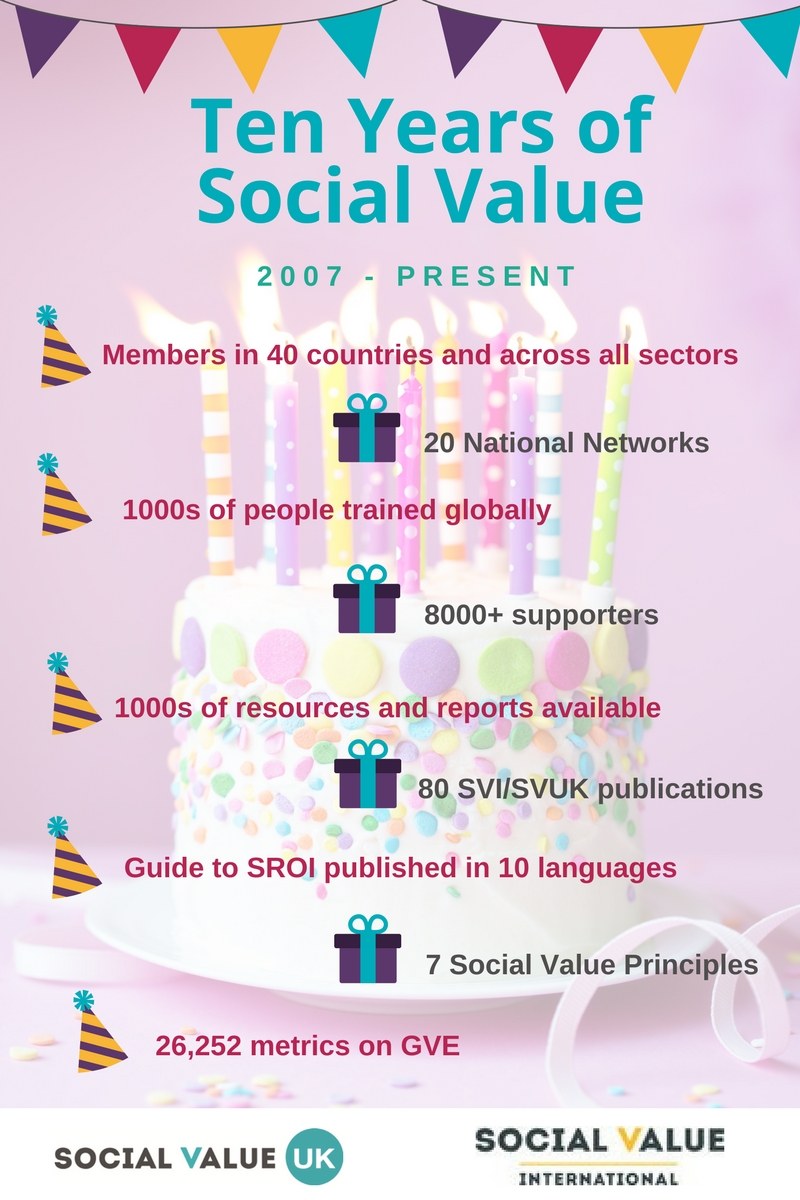
Posted 9th October 2017
2017 is the tenth anniversary of Social Value International and Social Value UK. A lot has happened in ten years. This blog is to celebrate all we’ve achieved as a community and look to the what we have coming next.
‘We have come a long way in ten years. But measured against our goals, to change the way the world accounts for value in order to reduce inequality, we still have a long way to go. We’re not quite a difficult teenager but I suspect we’re going to need to become one.’
Jeremy Nicholls, CEO Social Value UK and Social Value International
Where did we start?
Ten years ago, Social Value UK started from a group of passionate individuals from across the UK, sitting in a pub in Newcastle. We had seen the innovative work done by Jed Emerson and thought that an approach to accounting for value, holding organisations to account for their social and environmental impact, could help to address increasing inequality and environmental degradation. At its heart, this approach would depend on using social accounting to give those without power a voice in making the decisions that affect their lives.
We set up as a membership organisation, so that people could get involved and help develop this approach. By 2009 we had 200 members, had published our guide , ‘A Guide to Social Return on Investment’, established an accredited training course and launched our assurance process.
Where are we now?
We continue to be at the forefront of the social value and social impact community with over 8,000 supporters in over forty countries. Our network has expanded from one country to 20 country networks, with Thailand and Turkey joining in 2017, including members from across public, private and non-profit sectors. Alongside our own practitioner training, where we estimate over 5,000 people have now been trained, we now run training programmes with other membership organisations including European Venture Philanthropy Association, Asian Venture Philanthropy Network and Social Enterprise UK. We have produced a number of standards to supplement our guidance which is now available in 10 languages. We are the only place which provides an international standard for the assurance of your impact. And, as with all our standards, you can help us by getting involved in their on-going development.
We developed a powerful and simple Self Assessment Tool with Hall Aitken which is also used as the basis for certification as a Social Value Organisation. The Social Value Self Assessment Tool is designed to help users judge how well they are measuring and reporting on their social value, in line with the Principles of Social Value. The tool is comprised of a seven stage questionnaire, showing results as a spider chart illustrating a baseline, areas of strength and areas for improvement.
We also run the Global Value Exchange, an online open platform that allows users to set up their own projects, start to monitor the social value they are creating, and manage and maximise their social value. It is an open resource that anyone can add to and comment on. It houses 22 existing data sets, including the NHS Outcomes Framework 16/17, IRIS 4.0 and Washington State Institute for Public Policy Benefit Cost Model as well as others. These data sets cover over 26,000 metrics and another 10,000 user entered metrics, covering of outcomes, indicators and valuations. GVE now also has an interactive project layer where you can enter and collect social value data for your own activity or project and manage the social value of multiple projects.
What else is happening?
Our argument was and still is today that decisions on allocating resources, in public, private and non-profit sectors are still being made without considering their effects on people and the environment. As the gap between rich and poor increases and the effects of climate change become more apparent, our work has never been more urgent. Across the world this is being recognised. The work of World Business Council for Sustainable Development on social capital protocol, the Natural Capital Committee on the Natural Capital Protocol, the Impact Management Project for impact norms for investors and the addition of impact valuation to the Dow Jones Sustainability Index are all examples of improving and converging practice.
In Japan we are working on an impact measurement roadmap, laying out a vision and action steps to realise important elements of social impact measurement practices by 2020. In Italy we worked with the Ministry of Labour to define principles and approaches for framework for evaluation and reporting of third sector organisations and in New Zealand our work on relationship building across sectors made impact measurement a hot topic featured in publications such as Te Kura Nui o Waipareira. Our work in Canada has informed the SROI evaluation of the social enterprise development fund (SEDF) A lot of our work continues to focus on integration and convergence across sectors and globally we are involved, for example, in World Economic Forum with a stakeholder voice action group, the Social Stock Exchange, BSI planned social value standard, and the OECD Social Impact Investment Initiative, which is working on developing global data standards, with the goal of increasing transparency and accountability.
What are we doing next?
We have now realised that the pressures that contribute to inequality and environmental degradation include the relentless pursuit of financial value, within a model that assumes we want to maximise our personal financial returns. As a consequence, we now need to campaign to change society’s mainstream approach to financial accounting. We also believe that we need a relentless pursuit of social value if we are to offset the consequences of our existing mainstream approach to financial value. We have recognised that this means decisions will need to be made with data that is good enough for that purpose and that appropriate assurance, just like audit, is the key to unlocking good enough data. The upcoming guide, ‘Maximise your Value’, developed with partners in Estonia and Turkey, reflects this approach.
Ten Years On?
In ten years’ time our international community will have continued to grow and our Principles will be widely recognised. Most of all, organisations will be being measured against their ability and willingness to listen and respond to those whose lives they affect and then change what they are doing as a result.
Being a member of Social Value International helps you stay connected, be informed, save money, get business and maximise the value you create! Join our vibrant, global membership community and reduce inequality and environmental degradation by changing the way the world accounts for value. Join us today.
We would love to hear from all our networks and members about what has changed for them in the last ten years, please join the conversation in the comments!
